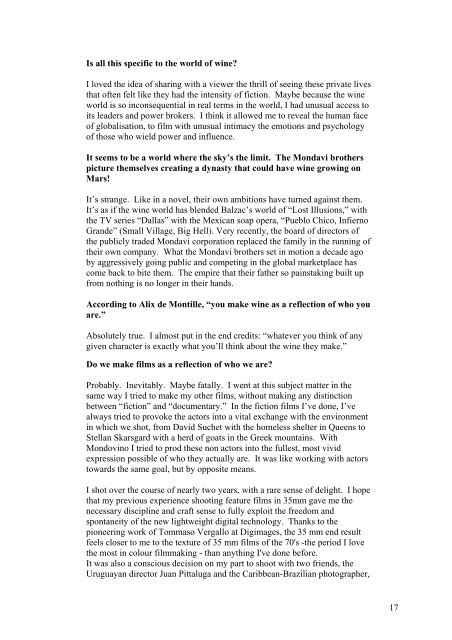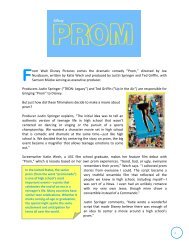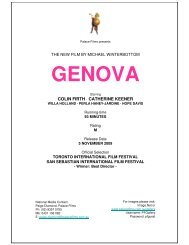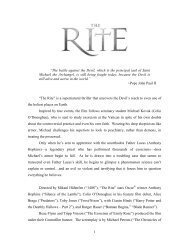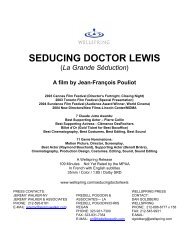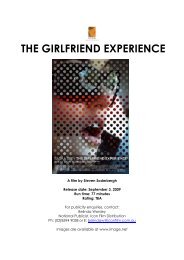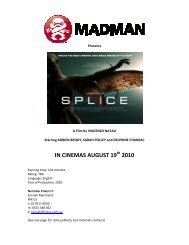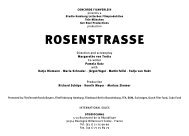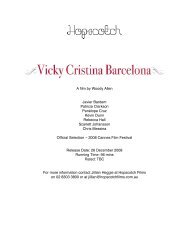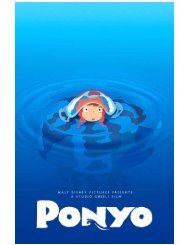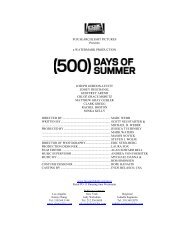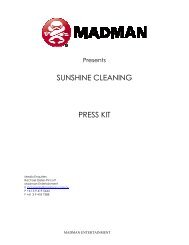Create successful ePaper yourself
Turn your PDF publications into a flip-book with our unique Google optimized e-Paper software.
Is all this specific to the world of wine?<br />
I loved the idea of sharing with a viewer the thrill of seeing these private lives<br />
that often felt like they had the intensity of fiction. Maybe because the wine<br />
world is so inconsequential in real terms in the world, I had unusual access to<br />
its leaders and power brokers. I think it allowed me to reveal the human face<br />
of globalisation, to film with unusual intimacy the emotions and psychology<br />
of those who wield power and influence.<br />
It seems to be a world where the sky’s the limit. The Mondavi brothers<br />
picture themselves creating a dynasty that could have wine growing on<br />
Mars!<br />
It’s strange. Like in a novel, their own ambitions have turned against them.<br />
It’s as if the wine world has blended Balzac’s world of “Lost Illusions,” with<br />
the TV series “Dallas” with the Mexican soap opera, “Pueblo Chico, Infierno<br />
Grande” (Small Village, Big Hell). Very recently, the board of directors of<br />
the publicly traded Mondavi corporation replaced the family in the running of<br />
their own company. What the Mondavi brothers set in motion a decade ago<br />
by aggressively going public and competing in the global marketplace has<br />
come back to bite them. The empire that their father so painstaking built up<br />
from nothing is no longer in their hands.<br />
According to Alix de Montille, “you make wine as a reflection of who you<br />
are.”<br />
Absolutely true. I almost put in the end credits: “whatever you think of any<br />
given character is exactly what you’ll think about the wine they make.”<br />
Do we make films as a reflection of who we are?<br />
Probably. Inevitably. Maybe fatally. I went at this subject matter in the<br />
same way I tried to make my other films, without making any distinction<br />
between “fiction” and “documentary.” In the fiction films I’ve done, I’ve<br />
always tried to provoke the actors into a vital exchange with the environment<br />
in which we shot, from David Suchet with the homeless shelter in Queens to<br />
Stellan Skarsgard with a herd of goats in the Greek mountains. With<br />
<strong>Mondovino</strong> I tried to prod these non actors into the fullest, most vivid<br />
expression possible of who they actually are. It was like working with actors<br />
towards the same goal, but by opposite means.<br />
I shot over the course of nearly two years, with a rare sense of delight. I hope<br />
that my previous experience shooting feature films in 35mm gave me the<br />
necessary discipline and craft sense to fully exploit the freedom and<br />
spontaneity of the new lightweight digital technology. Thanks to the<br />
pioneering work of Tommaso Vergallo at Digimages, the 35 mm end result<br />
feels closer to me to the texture of 35 mm films of the 70's -the period I love<br />
the most in colour filmmaking - than anything I've done before.<br />
It was also a conscious decision on my part to shoot with two friends, the<br />
Uruguayan director Juan Pittaluga and the Caribbean-Brazilian photographer,<br />
17


